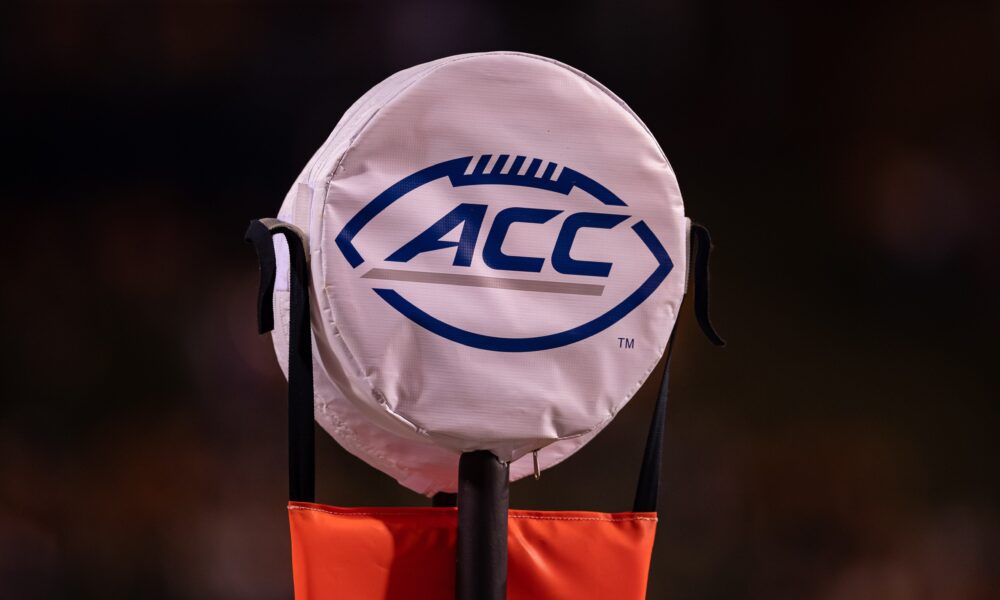CLEMSON — A day after Clemson filed a motion to dismiss the Atlantic Coast Conference’s lawsuit in the state of North Carolina, the ACC did the same a day later.
On Monday, Clemson University filed a brief in Mecklenburg County, N.C., requesting the court to support the motion of dismissal of the ACC’s claim Clemson should not be allowed out of the Grant of Rights (GOR) agreement or escape the league’s exit fee.
This past Tuesday, the ACC field a motion at the Pickens County Courthouse to dismiss Clemson’s civil suit, saying the South Carolina court lacks personal jurisdiction over the ACC and there is another pending action between the parties for the same claims in the North Carolina Court.
In addition, the ACC moved to dismiss the Fifth Cause of Action of the Amended Complaint on the ground that the South Carolina Court does not have the subject-matter jurisdiction to determine whether the North Carolina Court has jurisdiction over the claims of the ACC against Clemson.
In its motion on Tuesday, the ACC brings up its case with Florida State and claims the North Carolina Court has already made significant legal decisions concerning the law governing these agreements and the jurisdiction of the North Carolina courts.
“Clemson’s lawsuit in South Carolina appears designed to avoid these decisions where possible and, at a minimum to avoid those decisions when not in its favor,” the motion says.
The ACC says Clemson has nothing to stand on in its claim because the revenue Clemson receives from the ACC is based on North Carolina law, which it agreed upon when signing the GOR Agreement.
“All Members operate under the same Grant of Rights and the same ACC Constitution and Bylaws. These agreements are, moreover, governed by North Carolina law,” the motion says. “The ACC cannot function – – and no athletic conference could function – – if the same agreements (or the same clause in the agreements) were subject to differing interpretations across 10 jurisdictions (states). Permitting this lawsuit to continue would invite contradictory judgments or conclusions and raise the specter of one judgment that reached one set of conclusions being valid only in one state, while a different judgment reaching different conclusions is valid elsewhere.
“The potential for contradictory judgments will not settle the interpretive disputes raised in these lawsuits. Instead, it will only make them worse and inject more uncertainty into whether these agreements are valid or not.”
A hearing on Clemson’s Motion to Dismiss is presently set for July 2, 2024, in North Carolina Business Court.
“Clemson thus asks this Court to do something that it cannot do — decide an issue of North Carolina jurisdiction presently pending before the North Carolina courts and, effectively, order that North Carolina has no jurisdiction over Clemson,” the motion says.
This past Monday, Clemson asked the North Carolina Court to dismiss the ACC’s case because there is no issue to argue. Clemson is not arguing the GOR are not enforceable, only that it is not enforceable after it leaves the league.
Clemson is asking the court to tell it what the contract says because the ACC and Clemson cannot agree, which is why Clemson filed for a request for Declaratory Judgement.
Last week, Clemson University claimed the ACC made false claims about its scope of the (GOR), in an amendment to its original complaint on March 19. Last Friday, a Pickens County judge ordered the ACC to show Clemson University its ESPN Agreements.
The school is also seeking punitive damages against the ACC, as the damages incurred to remedy the damage to Clemson’s intangible property rights caused by the ACC’s misstatements about the GOR.
A limited number of signed footballs from Clemson’s 2022 class are still available. Get yours while supplies last! Visit Clemson Variety & Frame or purchase online!

